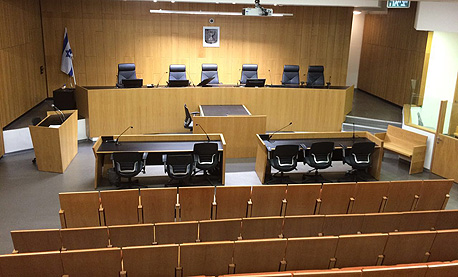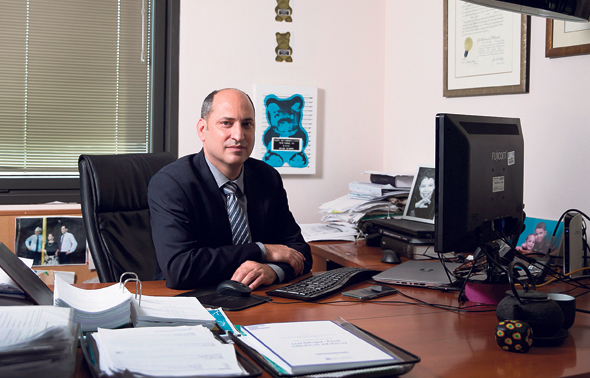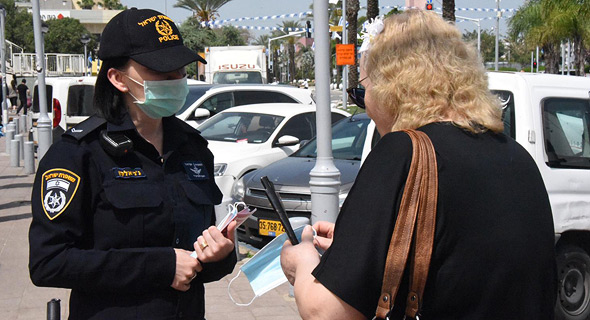Covid-19 Crisis Sidelined Individual Rights and Hurt Relations Between Police and the Public
Yoav Sapir, Israel’s National Public Defender, witnessed how quickly justice was eroded under the state of emergency—cops that acted out of order, courthouses that shut their doors to the needy and undue surveillance of citizens— but he still believes that Covid-19 is an opportunity to make improvements
09:0217.05.20
 A court room in the Tel Aviv District Courthouse. Photo: Golan Friedenfeld
A court room in the Tel Aviv District Courthouse. Photo: Golan Friedenfeld What happened to our rights during this crisis?
“The state of emergency provided law enforcement with new authorities that infringed on individual rights. Covid-19 gave rise to new forms of interactions between the police and the public, friction points increased, and in some cases escalated as we saw when cops tried to prevent people from filming enforcement activities.
 Yoav Sapir. Photo: Orel Cohen
Yoav Sapir. Photo: Orel Cohen Who was particularly harmed during this period?
"The weakest are always harmed the most. We saw far fewer arrests in general during this period, but there were cases of police detaining people who are in financial distress, some of which were cases that could have been resolved without criminal proceedings. The treatment of such cases should be rehabilitative, through the welfare agencies, it is wrong to treat them like criminals and use the criminal justice system’s blunt instruments against them."
Sapir, 49, was one of the original founders of Israel’s public defense office in 1997, he went on to complete a law degree and a PhD at Harvard, returned to work for the state, and eight years ago was appointed to head the system. As part of his job, he repeatedly issues warnings about problems with law enforcement and cases of civilian harm. Just this week, for example, he did so in the aforementioned letter he sent to the Attorney General and to the interim chief of police, urging them to instruct officers not to prevent civilians from filming cops and documenting enforcement, arguing that "a citizen has the right to document the incident, and there is no legal authority that requires them to cease doing so or to destroy the documentation."
Sapir explains that there have never been so many emergency regulations and restrictions on freedom of movement as there are in Israel now and that in several cases police officers on the ground have taken an even wider interpretation of their authority. He relays numerous cases in which the public defense office proved to the court that police officers had acted counter to regulations, for example, a case in which residents of Deir al-Assad were arrested when they went out to buy bread, with officers claiming the residents resisted arrest and attacked them. A video later proved the residents were innocent. He tells of a homeless person who was required to be quarantined and arrested for not having a place to stay. Sapir also spoke about cases of theft and burglary by people in search of food during the deepening economic crisis, like the case of a person who went into a storage room of a closed restaurant and took frozen chicken cutlets, or another who stole coffee and cookies from a care center for the elderly.
 A police officer wearing a mask. Photo: Isael Police
A police officer wearing a mask. Photo: Isael Police What is your position on the infringement of privacy caused by mobile phone tracking put in place for epidemiological investigation or foreclosure enforcement?
"We wanted to make sure that these actions were limited only for emergency purposes and that the authorities would not use them for other matters, so we insisted that the police recordings, which during the Covid-19 crisis were carried out without a court order, be used exclusively for the purpose of enforcing the isolation regulations. There were those who thought otherwise, arguing that if evidence of criminal offenses were discovered in the recordings, police could make use of them. We thought it gave the police disproportionate authority under the auspices of emergency measures and insisted that legislation provide explicitly defined limits to the use of surveillance tools. It seemed like our position was accepted, but in fact, this issue has not been decided on yet, because the parliament froze the legislation process after the emergency regulations expired."
And at the same time, the lockdown led to trial delays.
"That’s right, and it has a significant impact on people's liberty. We are fighting for hearings to be conducted. Initially, it was not at all clear that detainee hearings could be held, only initial state requests for detention. That meant people could sit in jail and even reach a plea bargain but had no way to present it to the court in order to receive a ruling and be released. After we complained, the courts administrator allowed detention hearings to proceed, and I have been in touch with him with the goal of expanding the trend."
Which procedures are still not taking place then?
"The main problem is that evidence hearings are not being conducted at all, and detainees who want to conduct such hearings and maintain their innocence need to seek special approval from the president of the court. It is unacceptable that people who are detained until the end of proceedings continue to sit in jail, with their trial on hold just because of the coronavirus. Their procedures are no less important than gyms or other things that have opened up for business, and holding them is no more dangerous."
What about appeals?
"The state's position was that appeals were not urgent enough. We had a case in the Southern District of a man convicted of drug and assault offenses and sentenced to a year in prison. He had already been in jail for about eight months and appealed the severity of the sentence, and the court was unwilling to hear his case because we were in the state of emergency. We had to fight the decision and take it to the Supreme Court, and only then did the State Attorney's office change its position and announce that it would not oppose to hear the appeal. The appeal was heard and partially accepted, and today the man is back in his home. As a result of this case, the courts began to hear criminal appeals again."
The courts are gradually returning to their routine activities. Are there hearings that still cannot be held?
"There are two types of hearings that still aren’t being heard without special permission by the president of the court, and we are fighting for them to return very soon. The first is inmates' petitions, which the Prison Service object to. In our opinion, it is precisely during this period, when prisons are completely closed to prevent contagion and prisoners' rights are severely impaired — they have no vacations, family visits and socializing, not even lawyer visits — that it is vital that prisoners be allowed to make their claims. It is currently in discussions and if it does not work out soon we will petition the High Court. The other type of hearings that haven’t resumed yet are detainees' evidence hearings. Obviously, it is difficult to conduct such hearings remotely, using video calls, but when the country returns to full activity, it must build an outline for resuming all of the hearings, including bringing detainees before a judge.”
Did the emergency measures bring about any new tools or practices?
"Yes, when it comes to arrests there are quite a few positive things that should stay in place even when we return to routine. For example, the stipulation that the arrest was indispensable. Every detainment should examine whether holding a suspect in jail is really essential. Determining whether there exists an alternative to detention ought to become commonplace.”
What enabled the reduction in the number of arrests, especially those that require detainment until proceedings are complete?
"The state temporarily increased the number of electronic monitoring devices (an addition of about 250 electronic handcuff kits), another example of something that should remain with us. Unequivocally, house arrest with electronic handcuffs is a cheaper alternative, both in financial terms and in terms of human liberties, we argue for it in every case.
"The state of emergency period is a sort of laboratory experiment that we can, and should, learn from. We learned that we can minimize the use of detainment in the criminal justice system, something that in normal times is often used as a default."
What about the use of technological solutions to conduct remote hearings. Should that be retained in order to cut the expenses and bother of transporting the defendants to court?
“Our position on remote hearings is less enthusiastic, because there are a lot of problems with it. It is a good solution for emergencies, because it is preferable to canceling hearings, but it violates a human’s right to be present at the place where his or her fate is settled. Sometimes the defense attorney needs to speak privately with the detainee and it is a challenge to do so remotely. There is also something important about having eye-contact with the judge. There is a difference between determining a person’s fate via video screen in a sterile environment, and the situation where the judge can look directly at a person, smell them, see the flea bites from the holding cell."



